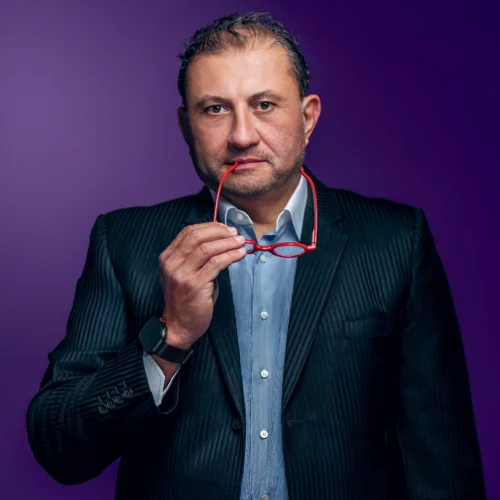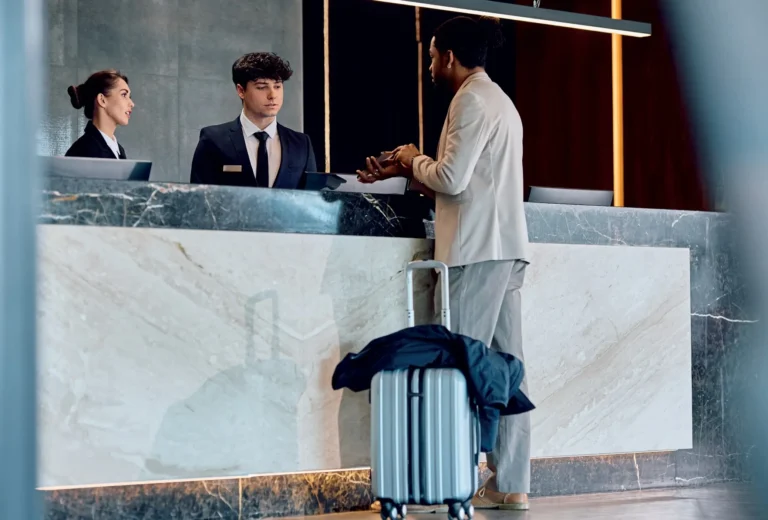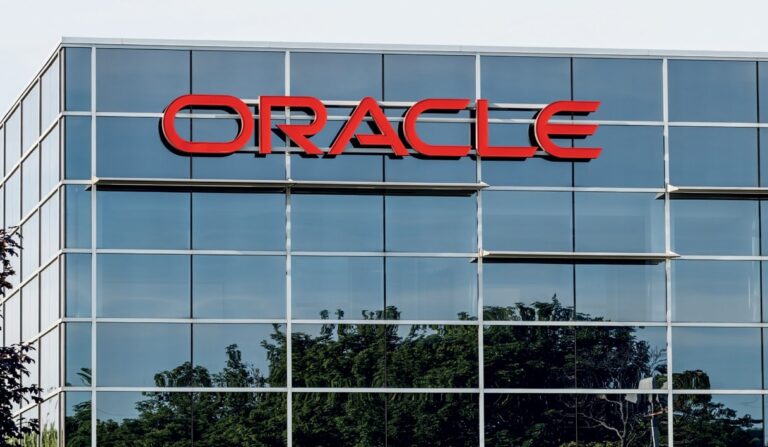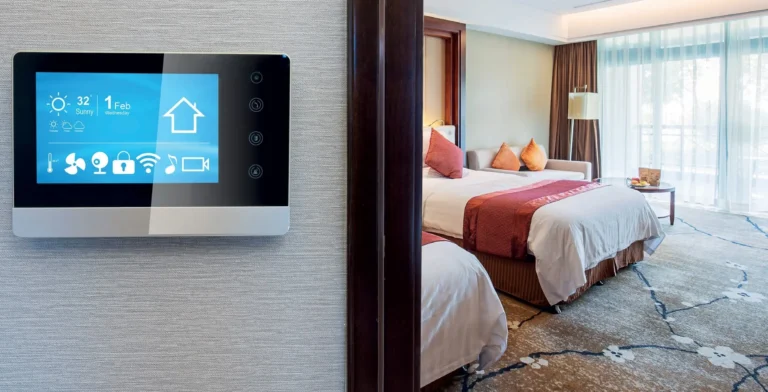How EMW and its founder, Serjios EL-Hage, is rewriting guest experience with Harmony with Webex

In an industry where service is measured in seconds and satisfaction hinges on immediacy, hospitality operators can no longer afford to be slowed down by legacy communication systems. From sprawling resorts to nimble boutique hotels, the pressure is on to modernise operations, reduce overhead, and deliver the kind of real-time, omnichannel experience that today’s guests increasingly demand.
It’s a tall order. And it’s exactly what EMW is looking to solve with Harmony with Webex — a purpose-built, cloud-native platform designed to unify hotel communications, automate routine interactions, and seamlessly integrate with back-end systems like Opera PMS.
“We saw a major disconnect between what hotels were using, and what their guests and teams actually needed,” says Serjios EL-Hage, Founder of EMW Computer Trading. “That’s why we built Harmony — to close that gap and bring modern, secure, AI-powered communication to every level of hospitality.”
El-Hage, a long-standing figure in the regional channel space, has spent years bridging enterprise-grade IT with vertical-specific needs. With Harmony, he’s gone further — developing a solution tailor-made for hospitality teams under pressure to scale faster, serve smarter, and work more efficiently.
Hosted on Oracle Cloud Infrastructure and powered by Cisco Webex, Harmony isn’t a voice system, it’s a full-stack communications platform that brings together telephony, messaging, call centre functionality, and guest services into one cohesive environment. It allows hotel staff to move between voice, video, and chat — whether they’re at the front desk, on housekeeping duty, or responding to a service request via mobile.
Most crucially, it integrates directly into hotel property management systems, including Opera PMS. This means when a guest calls with a room service request or sends a message about late checkout, the system knows who they are, what room they’re in, and what preferences they’ve flagged. Staff can respond in seconds—and without switching systems.
This level of integration also extends to internal teams. Maintenance, housekeeping, concierge, and security can all communicate through one interface, with automated task assignments triggered by real-time updates from the PMS. A minibar refill, a broken light fixture, or an early check-in request can all be routed and resolved without bottlenecks, calls bouncing between departments, or confusion at the front desk.

And while many legacy PBX systems were never designed to scale—or support remote and mobile staff—Harmony with Webex runs entirely in the cloud, allowing hotels to grow, shrink, or shift based on demand. For an industry known for seasonality and staffing complexity, this is no small advantage.
As EL-Hage puts it: “Hotels don’t need more systems. They need better integration—something secure, scalable, and designed for their environment. That’s exactly what Harmony delivers.”
And it’s not just talk. Harmony with Webex has already been deployed across a range of properties, from high-end resorts to compact city hotels. In one luxury property, coordination delays between front desk and housekeeping were pushing up response times—and dragging down guest satisfaction. After switching to Harmony, automated task routing, real-time chat, and PMS integration helped cut response times by 30%, with guest ratings improving significantly in just one quarter. In another case, a mid-size business hotel slashed its telephony-related operational costs by 40% by eliminating legacy PBX systems. Webex-enabled video and team chat replaced in-person huddles, while mobile access meant managers could coordinate from anywhere. “It’s not just about saving money,” EL-Hage notes. “It’s about freeing up people to focus on what matters—serving the guest.”
AI-POWERED, HUMAN-DRIVEN
At the core of Harmony’s value proposition is its use of automation and AI—not to replace the human touch, but to enhance it. The system includes intelligent call routing that automatically directs guest inquiries to the right department, cutting wait times and avoiding misdirected calls. It can also escalate complex requests to managers with context included, so no guest is ever asked to repeat themselves.
For front desk and concierge teams, virtual agents provide 24/7 multilingual support across voice, SMS, and chat apps like WhatsApp or Teams. These bots can confirm bookings, handle late checkouts, offer directions, or recommend dining options—all without involving a staff member unless necessary. “This isn’t a chatbot bolted on for novelty,” says El-Hage. “This is AI built into the core of the platform, with real understanding of hotel operations and the ability to improve them.”
Crucially, that same automation extends to internal workflows. Harmony connects directly to Opera PMS and other back-office platforms, allowing it to trigger task notifications based on room status, guest preferences, or maintenance flags. A leaky faucet?
⸻
Harmony’s Per User Monthly Payment (PUMP) model offers predictability and flexibility. Whether a hotel is growing, downsizing, or simply navigating peak season, it pays only for what it uses—eliminating upfront capex and costly over-provisioning.
“A lot of hotels are still running on infrastructure from the early 2000s,” says EL-Hage. “They’re worried that upgrading will mean downtime or disruption. With Harmony, we’ve made deployment plug-and-play. No rip-and-replace, no massive investment. It’s a smooth transition.”
And that’s no exaggeration. EMW’s team has built Harmony with hybrid deployments in mind—meaning hotels can keep their existing PBX systems or infrastructure as needed, while layering in cloud capabilities at their own pace.
POWERED BY ORACLE AND CISCO

A critical component of Harmony’s appeal is its cloud foundation. Hosted on Oracle Cloud Infrastructure (OCI) and using Cisco Webex as its communications engine, Harmony offers the performance, uptime, and security that enterprise hospitality environments demand. With 99.99% availability, redundancy across multiple data centres, and end-to-end encryption, it satisfies not just guest expectations but also regulatory compliance—whether that’s GDPR, PCI-DSS, or local privacy laws.
“Security is non-negotiable,” EL-Hage says. “Our clients handle sensitive data daily—guest records, payment details, even health information. Harmony ensures that all of it is encrypted, auditable, and protected.”
OCI also enables Harmony’s built-in disaster recovery and real-time monitoring features. Hotels can maintain business continuity during outages, monitor service quality, and even trigger failovers automatically in case of regional disruptions.
“Downtime isn’t just an inconvenience,” EL-Hage adds. “In hospitality, it can mean lost revenue, damaged reputation, and unhappy guests. That’s why we’ve built reliability into every layer of the system.”
SMARTER HOTELS, HAPPIER STAFF
Beyond efficiency and guest satisfaction, Harmony also helps address one of hospitality’s most pressing internal issues: staff burnout and turnover.
By reducing manual tasks, automating repetitive requests, and providing mobile access to team communication, Harmony lightens the load. Staff are more connected, better informed, and able to focus on high-value interactions—not chasing paper tickets or radioing for updates.
“One of our clients told us that since moving to Harmony, their team morale has improved dramatically,” EL-Hage shares. “Staff feel empowered, not overwhelmed. That’s the kind of impact that technology should be having.”
The platform also contributes to hotel sustainability goals. By reducing on-prem infrastructure, Harmony cuts energy consumption, cooling requirements, and hardware waste. Fewer servers, fewer cables, less downtime—and a lighter environmental footprint.

WHAT’S NEXT?
EMW is set to showcase Harmony with Webex at The Hotel Show Dubai (May 27–29, DWTC), where attendees will be able to experience real-time demos of PMS integration, AI-powered concierge bots, and mobile-enabled task workflows.
For EL-Hage, it’s a moment to show—not just tell—the value of vertical-focused innovation.
“We’re not selling software,” he says. “We’re delivering outcomes. We’re helping hoteliers run smarter operations, reduce costs, and deliver better guest experiences—all through a single, unified platform.”
Looking ahead, the roadmap is ambitious. Deeper integration with IoT smart room systems, advanced sentiment analysis, real-time translation capabilities, sustainability tracking dashboards, and zero-trust security models are all in development. But the mission remains the same: make hospitality simpler, smarter, and more human.
For channel players and system integrators, Harmony with Webex is a standout example of how industry-specific platforms can unlock new growth. It’s not a general-purpose UCaaS product—it’s deeply embedded in the workflows, systems, and realities of hospitality.
That vertical specialisation is key to its success—and it’s what makes EMW a compelling partner in the region’s cloud transformation story.
“Hospitality is changing fast,” EL-Hage concludes. “Hotels need partners who understand the business—not just the tech stack. That’s what we’ve built Harmony to be a bridge between the two.”
